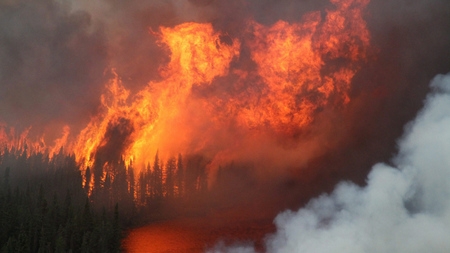
Strange Weather, Terrible Politics
It is July and, like an annual summer ritual, much of Canada and the U.S. are in the grips of a sweltering heat wave. Record temperatures were set for much of the country last week. The forecast, moreover, is for sustained heat with very little or no rain over the next short while. Many of those living in urban centers welcome the scorching hot days. The unrelenting heat makes the relief of spending a day at the beach and swimming in a cold lake or drinking beer on a shaded patio all that much sweeter. Venture beyond the city, however, and the issues the weather raises are often more immediate and pressing. In Northern Ontario, the intense heat has sparked hundreds of forest fires. The leaders of the Keewaywin First Nation and Land Lake First Nation respectively are asking the province to declare a state of emergency, as entire communities are being evacuated to escape the approaching blazes. Only weeks after the flooding of the Assiniboine River, the combination of sustained heat and rainless days has created fears of drought in the prairies. Farmers understand in a much more intimate way the dangers of an unstable climate generating extreme weather conditions. Flooding followed by unrelenting dry conditions weeks later is hardly conducive to good harvests.

To be sure, intense summer heat is nothing new. Moreover, the sources of weather patterns vary. The Pacific Decadal Oscillation, El Nino-Southern Oscillation and the North Atlantic Oscillation: all are climatic systems capable of playing havoc with weather. Thus who is to say that a couple of intensely hot and dry weeks in July can be attributed to something as relatively specific as greenhouse gas emissions? The problem is that record heat and dry days constitute only one example of extreme weather. Much of the U.S. mid-west has endured a particularly brutal tornado season and much of the Southern U.S. is contending with its own threat of drought. In Somalia, drought is fuelling the latest threat of famine.
Or consider Canada’s Arctic region. The Arctic has long been considered a bellwether region in the ongoing efforts to understand our climate. The area is thus always a focus in the reports published by the International Panel on Climate Change (IPCC). In them, the panel uses complicated computer models to predict the rate of melting of Arctic sea ice and glaciers. The IPCC has been criticized in the past for, among other things, selectively choosing data and alarmist projections. Yet a recent study sets out to answer the question of why arctic ice is melting much more rapidly than IPCC climate models anticipate. A group of UK scientists have made the following hypothesis. More recently formed ice has a heavier salt content than older ice. When recently formed ice melts it is thus denser and heavier than the surface water. It thus sinks and in so doing displaces warmer water, which rises to the top. The warmer water then accelerates the melting of the arctic ice. In keeping with the scientific method, the UK scientists insist more evidence is required before any definitive conclusions can be drawn. Nevertheless their hypothesis is very much in keeping with theories of how changes to the climate will unfold. That is to say, there is a very real risk that the warming process will initiate feed-back loops which will, in turn, amplify warming’s effects. Warming and its many consequences will thus not necessarily proceed in an incremental fashion.

This is precisely what climatologists have been warning us about. Changes to our climate will produce more examples of strange weather. Storms will be more violent and frequent. Weather patterns will be more volatile, thus rendering something as fundamentally important as farming much more difficult. This is especially true in arid or semi-arid landscapes, as the ongoing tragedy in Somalia demonstrates. Sea ice will melt and snow cover throughout much of the Northern hemisphere will continue to diminish. Such patterns will, in turn, initiate changes to biological systems. In order to stem these changes, most climatologists argue, greenhouse gas emissions must be dramatically curtailed.
One legitimately wonders how hot it must get or how much Arctic ice must melt before the Harper government understands the threats posed by a radically altered climate. Harper insists his government is prepared to act, but only in tandem with their U.S. counterparts. The problem, of course, is that all the forces in the U.S. are conspiring to minimize any concerted effort to actually address the issue. Congress is now controlled by the Republicans, many of whom consider climate change merely a hoax peddled by members of the media and rogue elements of the scientific community. They regard any government led efforts to address the dangers of a changing climate like universal health care, namely, as part of President Obama’s insidious campaign to create a more intrusive state. Indeed their rhetoric is a sad reflection of how shallow, unscientific and intensely partisan the GOP has become. Regrettably Obama has seemingly capitulated to GOP pressure tactics. In the early days of his administration Obama acknowledged the threats associated with climate change and promised action. But a moribund economy, persistently high unemployment, a staggering debt and the ongoing challenge of having to contend with a Republican controlled congress have created an alternative set of priorities for his government. Now he doesn’t use the term ‘climate change’ when speaking about American energy policy or when speaking at a memorial for the latest tornado victims.

The Harper administration has no such government impediments to addressing the issue. The Conservatives now have a majority and, besides, the Liberal Party, the NDP and the Green Party acknowledge the reality that many of the changes to our climate are anthropogenic induced. Nevertheless so long as the Obama administration does nothing substantive on the climate change file, we can expect a similarly dispirited effort from our own government. Despite his occasional claims to the contrary, this suits Harper just fine. He still doesn’t utter the term climate change when speaking publicly and indeed has expressed doubts that it is a real phenomenon worthy of our attention.
More importantly, any attempt to reduce Canada’s carbon emissions would require a dramatic shift in the government’s approach to Alberta’s tar sands development. Oil production is a source of carbon emissions and is thus a vital contributor to climate change. This has done nothing to stem the demand for oil, the price of which has been steadily rising for years. Alberta’s tar sands were too expensive to develop so long as the price of oil remained below a certain threshold. That has long ceased to be a problem. On the contrary, Alberta’s sustained economic boom is largely due to the tar sands. Harper would risk alienating his core constituency to address a problem he has yet to declare actually exists. Small wonder then that Canada has repeatedly received a “fossil of the year,” given to the country which demonstrates the least resolve in reducing green-gas emissions and addressing climate change.












